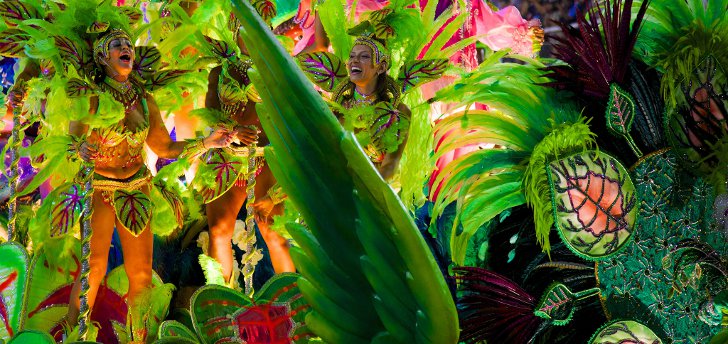Carnival is a Western Christian festive season occurring before Lent. It is held in February during the period known as Shrovetide. Most Carnivals involve processions featuring decorated floats, dancers, marching bands, and costumed characters. But Carnivals held in Rio de Janeiro, São Paulo and other southeastern cities of Brazil are special because their official parades feature local samba schools.
The Rio Carnival begins on the Friday before Lent and ends on Ash Wednesday, but the Winners’ Parade is held on the first Saturday of Lent. The highlight of the carnival is the samba school parades held at the Sambadrome Marquês de Sapucaí, a special venue built specifically for the Carnival. The official parades are held on four consecutive nights just before Lent.
Each samba school has 90 minutes to parade from one end of the Sambadrome to the other. There are dozens of schools in Rio de Janeiro so the parades can last for hours. All schools have to follow a special order with their parade entries. The group that appears first and introduces the school is known as comissão de frente. It is followed by the first float (abre-alas). These are followed by the room master and flag carrier who lead thousands of dancers in vibrant costumes, the drum section and a number of floats.
Participating schools are graded by the jury. The winner are declared on Ash Wednesday. The top five samba schools in the Special Group category participate in the Parade of Champions held the following Saturday.
The official parades of the Rio Carnival are ticketed events. As of 2017, seats ranged between $63 and $1259 depending on the type of seats and the event. Due to inflated prices many Brazilians can’t afford to attend the parade. That’s why the Carnival is also known for its free block parties called blocos and bandas.
Bandas and blocos are held throughout Rio de Janeiro. They begin in January and last until the Sunday after the Carnival. Unlike the official parades that only feature samba schools, street parades are free for anyone to participate. One of the largest street parties of Rio de Janeiro’s Carnival is Banda de Ipanema. It has been held every year since 1965. Banda de Ipanema was declared part of the cultural heritage of Rio de Janeiro in 2004. One of its main attractions is the spectacular drag queen parade.

Photo: Nicolas de Camaret




